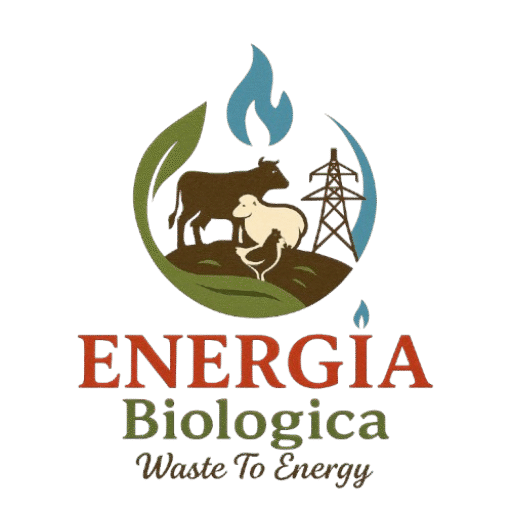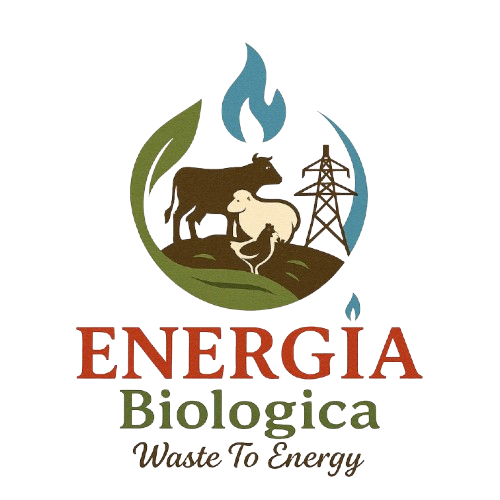The Circular Economy in Action: Waste-to-Wealth for Nigerian Agriculture
Nigeria’s agricultural sector, the backbone of its economy and a source of livelihood for millions, is simultaneously a significant generator of organic waste. From sprawling farms to bustling livestock markets, immense quantities of crop residues and animal manure are produced daily. Traditionally, much of this waste is either left to decompose, leading to greenhouse gas emissions, or improperly disposed of, polluting waterways and land. However, a revolutionary concept—the circular economy—offers a transformative solution. By embracing waste-to-wealth principles through biogas technology, Nigerian agriculture can unlock unprecedented economic and environmental benefits, converting liabilities into valuable assets.
Energia Biologica Limited is at the forefront of this profound shift in Nigeria. As a pioneering biogas industry facilitator, we champion a partnership-driven, integrative approach, bringing together essential stakeholders—finance, technology, construction, and operations partners—to realize impactful biogas initiatives. Our core mission is to catalyse sustainable biogas development in Nigeria, positioning biogas as a cornerstone of the nation’s agricultural and energy future, fostering a genuine waste-to-wealth transformation.
Waste-to-Wealth: Transforming Agricultural Byproducts
The essence of the circular economy in agriculture is to minimize waste and maximize resource utilization, creating a closed-loop system where outputs from one process become inputs for another. Biogas technology epitomizes this principle by converting diverse agricultural waste streams into high-value resources: clean energy and nutrient-rich organic fertilizer.
From Farm Waste to Clean Energy:
At the heart of this transformation is anaerobic digestion, a natural process where microorganisms break down organic matter in the absence of oxygen, producing biogas. In the Nigerian context, the primary feedstocks driving this agricultural waste energy revolution include:
- Livestock Manure: Nigeria boasts a substantial livestock population, particularly cattle, goats, sheep, and poultry. Concentrated livestock operations, such as dairy farms, commercial poultry facilities, and large cattle markets across states like Oyo, Kano, and Adamawa, generate enormous volumes of manure. This manure, if left untreated, releases potent greenhouse gases like methane and nitrous oxide into the atmosphere. Through anaerobic digestion, this manure becomes a powerhouse for biogas production, providing a sustainable and renewable energy source. For instance, the daily accumulation of tons of cow dung at major cattle markets like Kara in Sokoto or Agege in Lagos represents a significant untapped energy potential.
- Crop Residues: After harvests, vast quantities of crop residues—such as maize stalks, rice husks, cassava peels, and sugarcane bagasse—are often left on fields to rot or are burned. These practices contribute to air pollution, loss of soil organic matter, and greenhouse gas emissions. However, these residues are excellent substrates for biogas production. Nigeria generates millions of tons of agricultural waste annually from crops like cassava, groundnuts, cashews, and rice, all of which can be valorised into energy. Co-digestion of these residues with animal manure can further optimize biogas yields and enhance the efficiency of the process.
- Agro-Industrial Byproducts: Processing facilities for crops like palm oil (Palm Oil Mill Effluent – POME), cassava (cassava peels), and sugarcane generate significant organic wastewater and solid residues. These byproducts, traditionally pollutants, become valuable feedstocks for industrial-scale biogas plants, turning an environmental liability into an energy asset for the processing industries themselves.
The conversion of these wastes into biogas provides a reliable, decentralized source of clean energy for cooking, lighting, and even powering farm operations and rural homes. This reduces reliance on expensive and polluting fossil fuels or unsustainable firewood, thereby addressing critical energy independence Nigeria challenges and contributing to a greener energy mix.
From Digester to Fertile Fields:
Beyond energy, anaerobic digestion produces digestate—a nutrient-rich, pathogen-reduced organic fertilizer. This represents a crucial closed-loop component of the circular economy in agriculture:
- Improved Soil Fertility: Digestate returns essential nutrients (nitrogen, phosphorus, potassium) and organic matter to the soil, enhancing its structure, water retention, and microbial activity. This leads to healthier soils and improved crop yields.
- Reduced Chemical Fertilizer Dependency: By providing a sustainable, locally sourced alternative, digestate significantly reduces farmers’ reliance on costly imported synthetic fertilizers, thereby lowering input costs and increasing profit margins.
- Environmental Benefits: The use of digestate mitigates nutrient runoff and leaching associated with raw manure, protecting water bodies from pollution. Its stable form also means fewer greenhouse gas emissions compared to the decomposition of raw manure.
This integrated approach fundamentally redefines waste, seeing it not as an end product but as a valuable resource that can be continuously cycled back into the agricultural system.
Economic Benefits: Cultivating New Revenue Streams
For Nigerian farmers, cooperatives, and agribusinesses, integrating biogas technology offers a compelling suite of economic advantages:
- Cost Savings on Energy: Farmers can significantly reduce or eliminate expenses on diesel generators for electricity, kerosene for lighting, and firewood for cooking. This directly impacts their operational costs, freeing up capital for other farm improvements or investments. For instance, a small-scale biogas digester can supply enough cooking gas for a typical rural household, translating to substantial monthly savings.
- Increased Farm Productivity: The application of high-quality organic digestate leads to healthier soils and higher crop yields. Studies consistently show that fields enriched with digestate outperform those treated with raw manure, due to the more readily available nutrients and improved soil structure. This boost in productivity directly translates to increased income for farmers.
- New Revenue Streams: Beyond self-consumption, surplus biogas can be sold to neighbouring communities or industries. Furthermore, the high-quality digestate can be packaged and sold to other farmers, gardeners, or even commercial horticultural enterprises, creating an entirely new revenue stream from what was once a waste product. Some projects even explore the sale of carbon credits generated from methane capture, adding another layer of financial incentive.
- Enhanced Market Access: Farmers adopting sustainable practices, including biogas, may gain access to markets that prioritize environmentally friendly produce or inputs, potentially commanding premium prices.
- Job Creation: The development, construction, operation, and maintenance of biogas plants Nigeria, along with the handling and distribution of digestate, create numerous employment opportunities within rural communities, boosting local economies.
For agribusinesses, integrating biogas offers internal energy security, reduced waste disposal costs, and a sustainable brand image, all contributing to long-term profitability and resilience.
Environmental Impact: Beyond Waste Management
The transition to a circular economy model through biogas technology offers profound environmental benefits for Nigeria:
- Reduced Deforestation: By providing a clean alternative to traditional cooking fuels like firewood and charcoal, biogas directly reduces the pressure on Nigeria’s forests, combating deforestation and land degradation. This is particularly critical in regions where biomass is the primary energy source for households.
- Greenhouse Gas Emission Reduction: The capture and utilization of methane from decomposing organic waste (which is 25 times more potent than CO2 over a 100-year period) significantly reduces Nigeria’s greenhouse gas emissions. Furthermore, replacing fossil fuels with biogas contributes to a lower carbon footprint for energy consumption. This directly supports Nigeria’s climate action commitments under international agreements.
- Improved Public Health and Sanitation: Proper waste management through biogas technology reduces the proliferation of disease vectors, minimizes unpleasant odors, and prevents the pollution of water sources, leading to healthier communities.
- Biodiversity Preservation: Reduced reliance on chemical fertilizers and the promotion of healthy soils through digestate application contribute to the preservation of biodiversity in agricultural ecosystems.
Energia Biologica: Your Partner in Waste-to-Wealth Transformation
Realizing the immense potential of the circular economy in Nigerian agriculture requires more than just technology; it demands a strategic, integrated approach. Energia Biologica Limited excels in this role, acting as a crucial facilitator and integrator within the nascent Nigerian biogas industry. We understand the unique challenges faced by farmers, cooperatives, and agribusinesses, and we leverage our expertise to connect them with the right financial instruments, proven biogas technology solutions, reliable construction partners, and efficient operational frameworks.
Our focus extends to fostering integrated industrial park development biogas Nigeria, where synergies between waste generators and energy consumers can be maximized. We guide stakeholders through the entire project lifecycle, from feasibility studies and feedstock assessment to plant design, financing, construction, and long-term operation. This partnership-driven approach ensures that projects are not only technically sound but also economically viable and socially impactful. Our commitment is to translate the theoretical benefits of biogas into tangible, sustainable realities for agricultural stakeholders across the nation.
The path to a prosperous and sustainable Nigerian agriculture sector lies in embracing innovative solutions that see waste as a resource. The circular economy, powered by biogas, offers this exact pathway.
Discover how Energia Biologica can help transform your agricultural waste into revenue streams through strategic biogas development.
Let us work together to cultivate a future where Nigeria’s agricultural abundance fuels its progress, ensuring both food security and energy independence while championing environmental stewardship.

